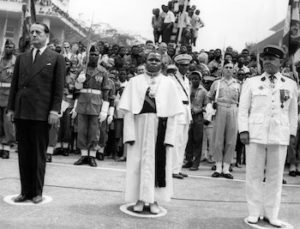
André Malraux (on the left), Abbot Fulbert Youlou,
the first President of the Republic of the Congo (center), and Colonel Daboval (on the right).
*On this date in 1960, the Republic of the Congo received full independence from France. They had been colonized as a result of the 1884 Berlin Conference. It marked the high point of white European competition for African territory, commonly known as the Scramble for Africa.
Fulbert Youlou ruled as the country's first president until labor elements and rival political parties instigated a three-day uprising that ousted him. Before independence, Congo was one of the most economically profitable French colonies. Between 1946 and 1959, several infrastructure projects were completed, and some light industry was established.
Thus, at independence, Youlou inherited a relatively healthy economy with 37.4% of GDP produced by the primary sector, 20.9% by industry, and 41.7% in the tertiary sector. Furthermore, in 1958, the Congo was home to 30,000 civil servants of varying qualifications and more than 80,000 students. This educational policy was strongly encouraged by Youlou, who assigned 40% of the 1960 budget to education. The Congolese military briefly took charge of the country and installed a civilian provisional government headed by Alphonse Massamba-Débat. Under the 1963 constitution, Massamba-Débat was elected President for a five-year term. During his term in office, the regime adopted "scientific socialism" as the country's constitutional ideology.
In 1965, Congo established relations with the Soviet Union, the People's Republic of China, North Korea, and North Vietnam. This regime ended abruptly with a bloodless coup in September 1968. Ngouabi, who had participated in the coup, assumed the presidency on 31 December 1968. One year later, President Ngouabi proclaimed Congo Africa's first "people's republic." The People's Republic of the Congo announced the decision of the National Revolutionary Movement to change its name to the Congolese Labor Party (PCT). He survived an attempted coup in 1972 but was assassinated on March 16, 1977.
An 11-member Military Committee of the Party (CMP) was then named to head an interim government, with Joachim Yhombi-Opango to serve as President of the Republic. Two years later, Yhombi-Opango was forced from power, and Denis Sassou Nguesso became the new president. Sassou Nguesso aligned the country with the Eastern Bloc and signed a twenty-year friendship pact with the Soviet Union. Over the years, Sassou had to rely more on political repression and less on patronage to maintain his dictatorship.